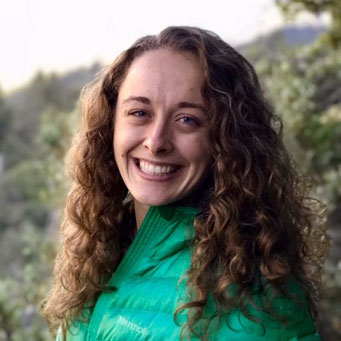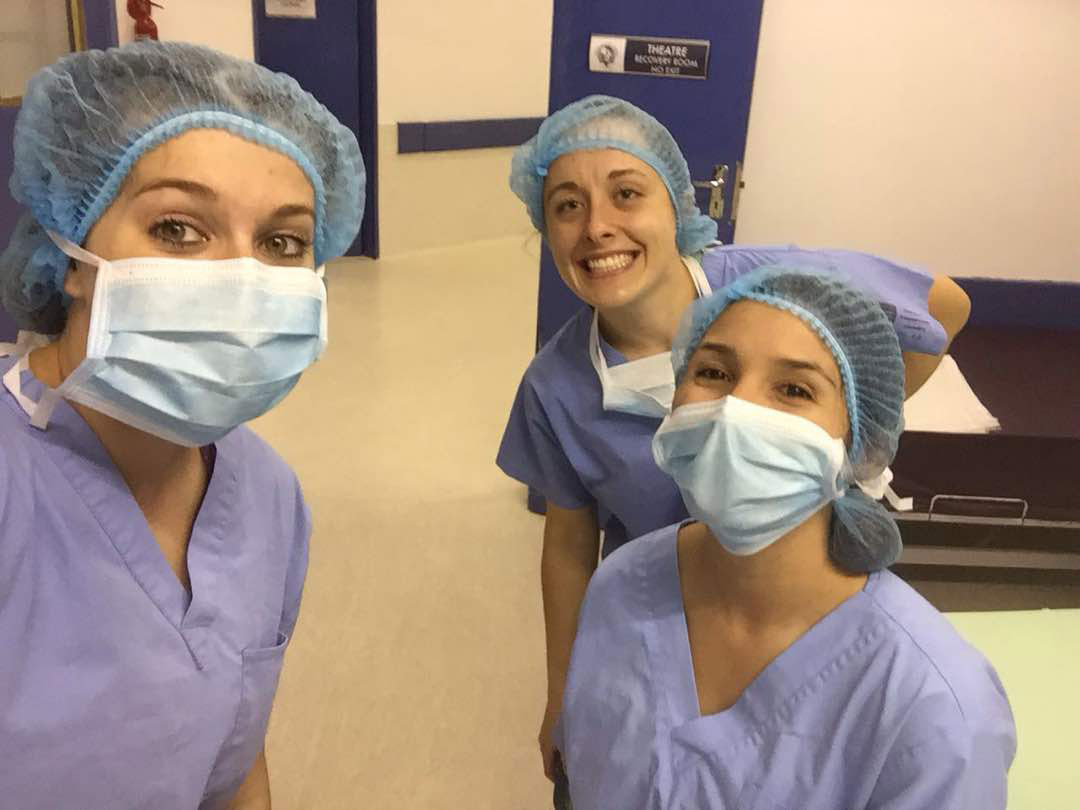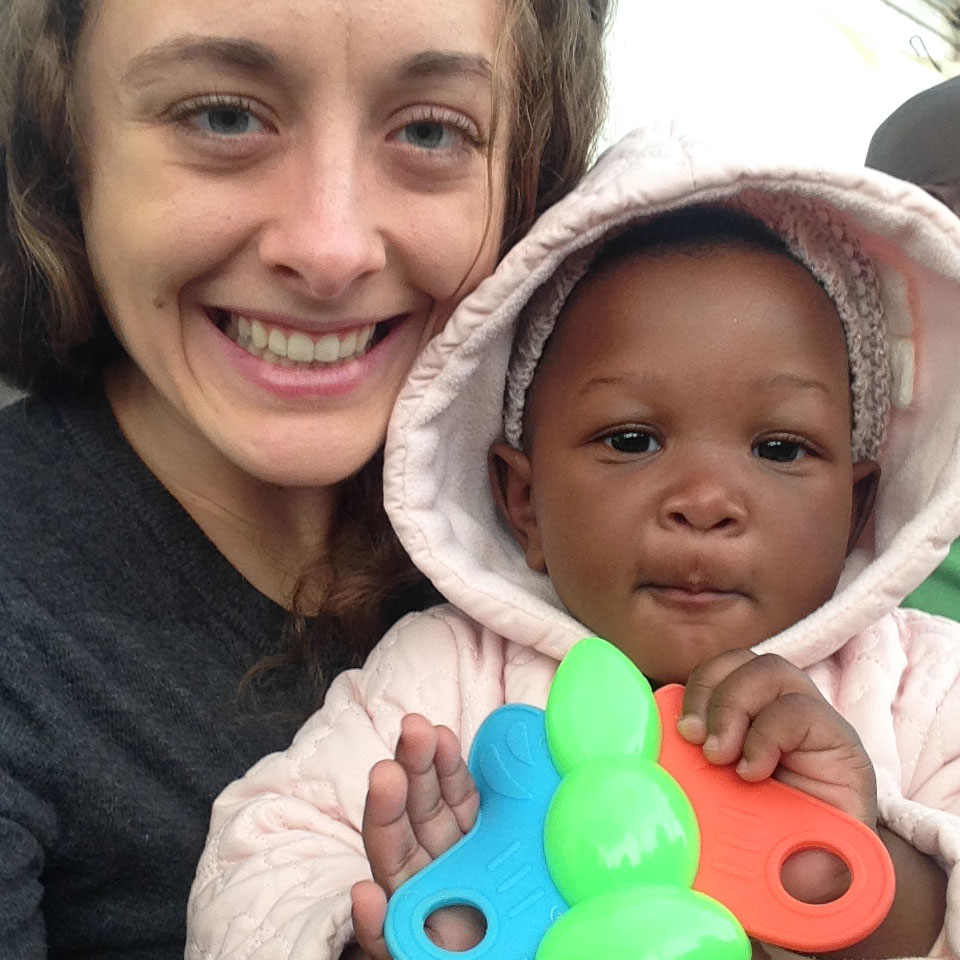
Katie Sloop
Always on Call
Where am I? And what am I doing here? These were my thoughts as I looked around the stifling hot and completely dark airplane. Airport terminal lights twinkled at me through the blurry windows; tarmac noise filled the plane through the wide-open exit doors. In front a drunken “talent show” was in full swing, complete with the likes of ‘Twinkle Twinkle Little Star’, rap vocals, and African love songs. Next to me, the young Ethiopian flight attendant was vainly trying to convince the latest drunk that he did not need another beer, while simultaneously keeping the six toddlers careening up and down the aisle from falling out of the open exit doors to the pavement below.
I was on Ethiopian Airlines in Dublin. We had all been stuck on this plane for 17 hours, of which the last five were sitting stationary amidst the rising frustration of both crew and passengers. We were en route to Addis Ababa, Ethiopia, when an electrical malfunction turned a routine fuel stop into a five-hour ordeal.
My final destination was Botswana. However, this electrical malfunction began a cascade of unanticipated and seemingly fortuitous events. The refueling turned into 24 hours in Ireland. My two-hour layover in Addis Ababa turned into 26 hours; my total traveling time came to 95 hours. Throughout it all, I wondered why God had allowed the plane to breakdown and me to miss the biweekly connecting flight to Botswana.
Part of the answer to “Why?” was found, I believe, in new friendships with fellow passengers. One was an American girl headed to Ethiopia and then to Madagascar. We were both single girls stranded in Dublin and Addis Ababa. The challenges of our travel delay, and her new staph infection, gave us a sense of camaraderie and a chance to discuss deeper topics such as impaired human relationships, God, and our faith. In addition, we struck up an unlikely friendship with a devout Muslim young man quite surprised to find a Christian who did not drink alcohol or eat meat. This also led to deeper discussions about God, Christianity, and Seventh-day Adventists.
However, it was not until I was actually sitting on that elusive flight from Addis Ababa to Botswana on Saturday morning, reluctantly sharing the last of my American trail mix with the two people sitting next to me, that I really got annoyed. Why is God having me fly on Sabbath? I had planned so carefully to make sure this would not happen! I was supposed to have arrived two full days ago. And, why does this guy have to sit next to me and eat my trail mix? The young Ethiopian man next to me was not so keen about being there either. There were plenty of open seats on the plane, but he had been kicked out of his Cloud Nine (first class) seat, and told to sit in a middle seat in Economy class.
His name was Ermias. He had studied biology in college and now ran a tourism company in Addis Ababa. Remarkably, we started talking about what the Bible says regarding the power of our words. I pulled out my Bible, thinking I could share a little bit with him. I quickly became very thankful for every Bible study that I had ever learned, for every verse I had ever memorized, and most of all for the promise of the Holy Spirit. Ermias was one of the most sincere and seeking Christians I have ever had the privilege of meeting. We discussed faith, grace, tithing, the state of the dead, the second coming, and even the Sabbath. As we neared landing, I told him that I normally go to church on Saturday mornings and was annoyed that I was flying right then. He turned to me and said, “We are having church right here!” He then told me that his brother, Elias, was the head manager of Ethiopian Airlines in Botswana and was on our flight. Though annoyed that his brother had not upgraded his seat, he now knew why: God had wanted him to sit next to me. At that moment, the reason I was on that particular Sabbath morning flight became clear to me. I was humbled, inspired, and challenged.
This account was just one example of a crucial spiritual principle that I have learned: as Christians we must be open to all opportunities that we have to witness. To use medical parlance—we are always on call, as experiences later in Botswana showed me too.
For instance, we had just finished an emergency D&C on Sabbath. I went by the surgery ward on my way out and the nurse there asked me to see a badly burned patient. The unfortunate woman’s family was all there and one of her sons spoke enough English to translate. I tried to explain her condition to the family, mostly repeating what I had overheard the surgeon saying to the nurse earlier. When I finished, the son looked at me and earnestly asked, “Will you pray for my mother?” I answered, “Yes, of course.” We did have prayer together, asking for Jesus to provide His presence and healing. I did not realize the significance of that interaction until, two days later, one of the other doctors was discussing the same patient and said, “You know, she is a traditional witch doctor, don’t you?” It hit me forcefully. What I had thought was “just a prayer” had been so much more in the battle between good and evil. It turned out that the only spiritual contact we were able to have with her was on that Sabbath afternoon. I realized, again, that in times we don’t expect, God needs us to be ready to share Him with the suffering souls of this world, and He does not give us weekends off either.
We are always on call for Him: days, nights, and weekends, even (perhaps especially) Sabbath.
 A few days later, I was in the maternity ward at midnight. The general practitioner there told me to go look at a patient in the emergency room. I found an elderly Motswana man with a deep snake bite. His wife was with him, and both mistook me for a specialist. I explained that I was not the “big doctor” but asked if there was anything I could do. The elderly man caught my hand, looked me straight in the eye, and asked, “Will you pray for me?” I was able to not only pray with this dear couple, but to talk to them about God, His leading and protection. I encouraged them to trust Him no matter what. Miraculously, the man dramatically improved and was able to be discharged from the hospital a few hours later.
A few days later, I was in the maternity ward at midnight. The general practitioner there told me to go look at a patient in the emergency room. I found an elderly Motswana man with a deep snake bite. His wife was with him, and both mistook me for a specialist. I explained that I was not the “big doctor” but asked if there was anything I could do. The elderly man caught my hand, looked me straight in the eye, and asked, “Will you pray for me?” I was able to not only pray with this dear couple, but to talk to them about God, His leading and protection. I encouraged them to trust Him no matter what. Miraculously, the man dramatically improved and was able to be discharged from the hospital a few hours later.
Yes—on call, even late at night.
One weekend I took a few days off to be with the Loma Linda University nursing students also in Botswana. Early Sabbath morning, I slipped out of my room, looking for some quiet time to read. As I walked up to a little rock pool, I met a worker cleaning the pool. We started talking and, eventually, I felt bad that he was cleaning and I was only talking. I asked him if I could help, expecting to get the usual no. I was surprised when he gave me his cleaning pole and took my Bible and water bottle. As I started cleaning, he asked me why my water bottle was full of warm water. This opened the way to talk about health, which led to a spiritual conversation. We talked about the Sabbath, Jesus’ life and death, faith, grace, forgiveness, and how God has transformed my life. He told me about his broken family, financial struggles, alcohol abuse, and how empty and guilty he felt. I explained to him that God forgives him, loves him, and wants to lead in his life. He struggled to understand, partially due to the language barrier. As breakfast time drew near and I needed to go, he looked at me and said, “Ngaka (doctor), I wish you could take me to church with you. I want Jesus to change my life.” This sentence be will be forever seared in my memory. “I want Jesus to change my life.” Oh, the cry of the heart expressed in those seven words!
Always, yes, always on call.
My final morning was consumed with packing and last-minute, teary goodbyes. I was anxious about getting to the airport with plenty of time to spare, a concern, unfortunately, not shared by my driver. We were already an hour late when he decided to stop for food. I had less than an hour before my international flight when we finally arrived at the Ethiopian Airlines ticket counter. It was then that I found out I did not have a ticket home. My entire return ticket had been inadvertently voided by airport personnel during the chaos in Dublin. Now the flight to Addis Ababa was full and the flight to LAX was overbooked. I wondered what God would do now. I didn’t speak Setswana, I didn’t have the money to book another flight home, and my phone had just died.
Suddenly Ermias and Elias walked in! I was shocked. They were supposed to have been in the Congo weeks before but had been delayed and were leaving that day when Elias had been called into the airport. They had arrived only 20 minutes earlier.
Elias was the only person in all Botswana who could help me, and he did, getting me through security, customs, and handing me a ticket to Addis Ababa and the promise of fixing the remaining segments of my trip while I was in the air. When I landed in Ethiopia, I was met by airport personnel and rushed to my next gate and immediately boarded an already extensively overbooked flight. Elias had managed to get my baggage through to my final destination, even though I was switching airlines. I do not know how Elias did any of this, but I do know that God was watching out for me.
 The lesson? God is always on call for us and He is calling us to be on call for others as well. Through this trip, I realized that God is calling each of us to minister to those who are desperately seeking. Like the gentleman at the game lodge, thousands earnestly want God to change their lives but don’t know how to take the first step.
The lesson? God is always on call for us and He is calling us to be on call for others as well. Through this trip, I realized that God is calling each of us to minister to those who are desperately seeking. Like the gentleman at the game lodge, thousands earnestly want God to change their lives but don’t know how to take the first step.
In addition, I realized God is not asking us to only be looking for opportunities to share Him and encourage others when we are at work 9-5, studying 6-10, or on Sabbath afternoons. We need to be open to His timing. Most of the experiences I shared happened when I was not supposed to be at the hospital.
God is calling us to always be ready to share Him; He is entreating us to make saving souls our top priority. He wants our whole lives to be oriented toward this work; He wants us to always be “on call” for Him.
<< | Table of Contents | >>
